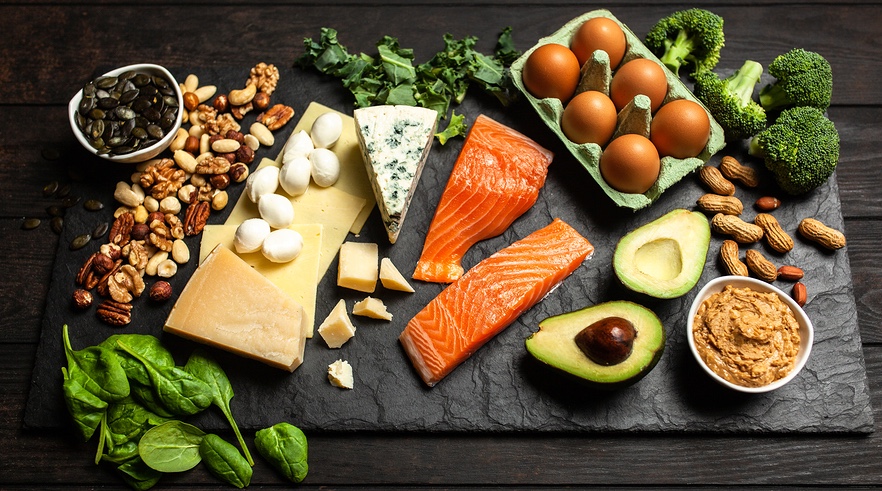
The ketogenic diet has become extremely popular in recent times. If you don’t know what it is, have you been living under the rocks? Every new year, we see a lot of people committing to a healthy diet and lifestyle. However, are you really able to follow the ketogenic diet to be a fitter and better you?[1]
The Tricky Part about Losing Weight
Everyone wants to get rid of those extra weights, but to cut it short isn’t as easy as it sounds. Compared to your physical regime, your diet plays a vital role in helping you get rid of those extra weights.[2] The easiest way to get rid of that extra weight is to follow the Ketogenic diet.
Ketogenic diet proves to be extremely helpful, as it not only increases the mental focus but also aids in weight loss. Therefore, it not only keeps you physically fit but mentally as well. People who have type 2 diabetes tend to benefit a lot from the Ketogenic diet. However, one of the most important questions to determine is if this diet is suitable for everyone or not. [3]
What is a Ketogenic diet?
It is essential to know what the Ketogenic diet is before proceeding on with it. The ketogenic diet is the low-carb diet; that is, it reduces the carbohydrate content from the body. Since carbohydrates are the main source of energy in the body, and once it is depleted, the body uses up all the stored fat to gain energy. This helps to burn fat at a faster rate.
Consuming foods rich in carbohydrates leads to the increased storage of glucose, which is used as energy.[4] The Ketogenic diet follows a standard pattern that is a moderate protein, rich in fat and low in carbohydrates. Some of the prominent foods consumed in a Ketogenic diet include nuts, eggs, meats, oils, seeds, and more.
The Ketogenic diet restricts the consumption of fruits, grains, and other foods rich in carbohydrates. As per the general rule, one needs to consume 5% of carbs, 20% of protein, and 75% of fats. As a result, you can consume only 20-50 grams of carbohydrates in a day.
The ketogenic diet is aimed at producing ketone bodies that help to increase the metabolism of fatty acids. This is further beneficial for glucose. Ketogenic diet began as a treatment of epilepsy in the 1920s as it helped to lower the symptoms of seizures in many patients. Even though there are many anti-seizure medicines in the market today, the diet plays a vital role in lowering it. [5]
The Ketogenic diet puts your body in a state of ketosis, which further proves to be beneficial for reducing weight.
How do I know my body is in ketosis?

The easiest way to determine whether your body is in ketosis or not is to check for ketones in your urine. Although this may sound a little complicated, the ketone strips available in the pharmacy stores can play an essential role in easing the process. The positive lines of the ketone strips ensure that your body is in the state of ketosis. Nonetheless, people must know that there is a difference between nutritional ketosis and diabetic ketoacidosis.[6]
Benefits of the keto diet
In a Ketogenic diet, you will be able to feel the difference yourself.[7] Some of the most prominent benefits, for instance, include the following.
- Improved athletic performance
Researches have shown that athletes who follow a Ketogenic diet tend to have high endurance capability. Keto and keto-like diets can be reliable because it uses up the stored fat, thereby helping the athletes to stay more active. It can be said that fat acts as a fuel and is more beneficial than simple carbohydrates. This is further helpful for endurance training and competition. Apart from that, it also helps in faster recovery.
- Lose fat at a faster rate
Losing excessive fat may sound like a tough task, but with the Ketogenic diet, it is easy. Keto diet helps to suppress the appetite, thereby making you feel less hungry. Although the keto diet isn’t much different from other diets in reducing diet, it is very helpful. However, you need to restrict food choices and consume fewer calories to ensure weight loss at a faster rate. Cutting out carbohydrates is one of the main decisions for cutting out calories. Compared to other diets, keto diet tends to show a more rapid response in losing weight.[8]
- Control over Type 2 Diabetes
Type-2 diabetic people must adopt a low-carbohydrate diet, mostly keto diet. Keto diet helps a lot in glucose management, thereby contributing to low risk. Certain studies have also shown that following a keto diet will reduce the need for taking medicines in type-2 diabetic people.
Shall I follow a physical exercise with the keto diet?
One of the most commonly asked questions is whether or not one should follow a physical exercise with the keto diet. If you want to reduce your body weight, you need to follow a proper physical exercise routine.[9]
Athletes following a keto diet may have trouble in recovery after training. However, casual exercises may not face many problems when it comes to following a keto diet. If you have been noticing a drop in your energy levels, you need to reduce your physical exercises.
If you suddenly start your keto diet, it may cause specific problems such as fatigue, tiredness, and nausea. It’s why we suggest following a slow and gradual process to ensure the best. Also, you may want to keep a check on what you have been eating – it’s going to help keep the calories and carb in check.
[1] https://www.ncbi.nlm.nih.gov/books/NBK499830/
[2] Włodarek D. Role of Ketogenic Diets in Neurodegenerative Diseases (Alzheimer’s Disease and Parkinson’s Disease). Nutrients. 2019 Jan 15;11(1) [PMC free article] [PubMed]
[3] Oh R, Uppaluri KR. StatPearls [Internet]. StatPearls Publishing; Treasure Island (FL): Jan 3, 2020. Low Carbohydrate Diet. [PubMed]
[4] https://www.ncbi.nlm.nih.gov/pmc/articles/PMC2716748/
[5] https://www.ncbi.nlm.nih.gov/pmc/articles/PMC6251269/
[6] Krebs HA. The regulation of the release of ketone bodies by the liver. Adv Enzyme Regul. 1966;4:339–54. [PubMed] [Google Scholar]
[7] Tony David K, Divyanjali P, Sai Krishna G. Ketogenic diet in the management of diabetes. Indo Am J Pharm Res. 2017;7:8109–15. [Google Scholar]
[8] https://www.ncbi.nlm.nih.gov/pmc/articles/PMC6371871/
[9] Wheless JW. History of the ketogenic diet. Epilepsia. 2008;49(Suppl 8):3–5. [PubMed] [Google Scholar]

